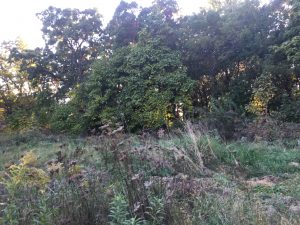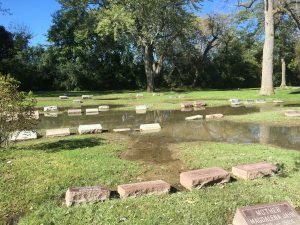Several years ago–I’m pretty sure I had my first blue Nokia cell phone at the time–I wandered off the beaten path and found Cedar Lake Conference Center. I called my dad and told him where I was. He immediately began singing an old camp song that he remembered from many years past:
“We’re down in Indiana, at Cedar Lake. Yo-ho!
We’re feasting on the manna, to the promised land we go. We’ll raise a loud hosanna and happy hours you’ll know.
At Cedar Lake in In-di-an-a.”
On Thursday, Dad’s birthday, I once again visited Cedar Lake. My mission was to find out more about the summer home my grandparents purchased in 1925.
Cedar Lake is in the back story of a Marshall legend. My grandparents, Robert and Janet Marshall, had purchased a summer home near Cedar Lake. I knew that it wasn’t on the grounds of the camp, but somewhere in the area.
For years I’ve intended to visit the Lake County Courthouse in Crown Point to hunt down the home that were living in on June 30th, 1925.
I found the Recorders Office several miles down the road in the Lake County Government buildings rather than at the Courthouse in the middle of town. The first three people I met were not very optimistic about my search, but I persisted and found the deed for their purchase on June 26th, 1925.
They bought the cottage on a Friday and must have started moving in right away. I’m guessing they spent the weekend there and settled in to spend at least part of the summer away from the city. Robert planned to commute back and forth to East Chicago, in his hard top touring car.
The following Tuesday, just four days later, that plan was turned upside down. Here’s the story I wrote from 11-year old Jean’s point of view. (Based on what she told me of her memories of that night.)
Jean couldn’t cry even though she had never felt so sad in all her life. She stared at the ceiling of her small room, longing to cry, longing for someone to tell her it was okay. Okay to cry (even if she was a big girl.)
She knew that nothing would ever be all right again. Her father was dead! Dead. How could that be?
No matter how many times she went over the story, it always turned out the same: She had been helping Mother prepare supper in the small cottage kitchen. They heard a car pull up in front of the house, and stopped to take off their aprons before greeting Dad at the door. Only it wasn’t Dad. It was two men from the conference who had come to tell Mother the awful news.
Jean saw her mother’s hands fly up in the air and heard her anxious questions while she tried to absorb the news.
An accident.
The car hit by a train and dragged down the track. A fire.
No one could have survived the crash.
Yes, they were sure it was Bob’s car.
Yes, the police and fire department had come.
Yes, he was in heaven now.
No, he wouldn’t be coming home to the cottage or home to his family ever again.
Then Mother had insisted on going to the scene of the accident, about a twenty minute drive from the cottage. The men hesitated and tried to talk her out of it, but she had insisted that she needed to see it. The children were too young to leave behind so they were bundled into the vehicle as well.
There at that barren corner where the tracks crossed the Calumet highway, Jean had huddled in the back seat with her two little brothers, scared, shocked, unbelieving.
There really wasn’t much to look at. The car was a mangled, burned mess off to the side of the track. The train was long gone. The police and fire trucks had just pulled away. One lone policemen led Mother by the arm, explaining what he knew about the accident.
A car had stopped for the oncoming train, but father had pulled around it and tried to cross the tracks ahead of the train. He hadn’t made it, crossing directly in the path of the Scotsman flyer. There had been a terrible screech and explosion as the train impacted the car and dragged it further down the track. The machine had burst into flames.
Jean watched as her distraught mother wandered around the site. She saw her bend down with a handkerchief, pick something off the ground, and put it in her pocket.
Finally, Mother returned to the car and they went back to the cottage where they immediately began packing their belongings. The would return to Chicago in the morning. .
Weeks later, when it was all over; when the funeral was done and Father had been buried next to Agnes; when they moved back home to their apartment on Green street, Jean asked her mother what she had picked up that day.
“Your father’s brains.”
When I shared Aunt Jean’s story with a friend, she asked if my Gramma was being sarcastic. I immediately said “no” but the more I thought about it, the more I believed that she was expressing both shock and anger. Robert made an impulsive and foolish choice that day, a choice that would impact his family for years to come. My father was born four months later.
I don’t know (yet) what happened to that cottage. I was able to locate an address and get a copy of Real Estate Assessment and Transferred Records, but they only go back as far as 1958. Even so, there are hints of more story: the first name on the record is Mary R Christie, a sister-in-law of Janet’s second husband. Her son’s name (a nephew) is in the top left hand corner of the document and Lawrence’s name is also on the original deed as the notary public. More puzzles to unravel.
 I did find the land, but no cottage. There was even a For-Sale (“Best Offer”) on the ground. Speaking of land, I’d also stopped at Mt Hope Cemetery on the far south side of Chicago earlier that day. The final resting place for Robert Marshall (and two of his children) is an unmarked grave in a back corner of the cemetery that isn’t cared for well at all.
I did find the land, but no cottage. There was even a For-Sale (“Best Offer”) on the ground. Speaking of land, I’d also stopped at Mt Hope Cemetery on the far south side of Chicago earlier that day. The final resting place for Robert Marshall (and two of his children) is an unmarked grave in a back corner of the cemetery that isn’t cared for well at all.

I ended my day, somewhat coincidentally, at Palos Hills Christian Assembly, the Plymouth Brethren off-shoot of the “hall” at 86th & Bishop my grandparents attended. It was also my Dad’s home church for at least twenty years of his life. I was there for a memorial service, but couldn’t help reflecting on these family stories as well. Years later, Janet Christie, my grandmother, said “There are no tragedies in life.” She trusted that every part of her story was within God’s plan for her life–and ours.
It’s easy for me to wonder “what if?” they hadn’t bought that cottage…or Robert hadn’t been commuting back and forth. What if he’d simply stopped behind the other car? How would the story of our family have been different? Would it have been better? Or just different?` I probably wouldn’t go so far as my grandmother, to say there are no tragedies in life, but I could well relate to the words of Immanuel’s Land:
With mercy and with judgment
My web of time He wove,
And aye the dews of sorrow
Were lustered with His love!
I’ll bless the hand that guided,
I’ll bless the heart that plann’d,
When throned where glory dwelleth
In Immanuel’s land.
P.S. Immanuel’s Land actually has nineteen stanzas. It was written by Anne R. Cousins in 1876, using letters written by a Scottish pastor, Samuel Rutherford (1600-1661.) Read his story here.

Captivating story, beautifully portrayed.
Well written, Chris!
I have memories of Mom singing “In Immanuel’s Land”, one in particular of her singing verse after verse from memory as she vacuumed the stairs at the Sandhill home. Not all eighteen verses, of course, just the ones in our hymnbook. She told me before her hysterectomy operation when I was in high school that she wanted it sung at her funeral, but I wasn’t there to see that that wish was carried out. Wonderful hymn.
John sang it at her funeral!